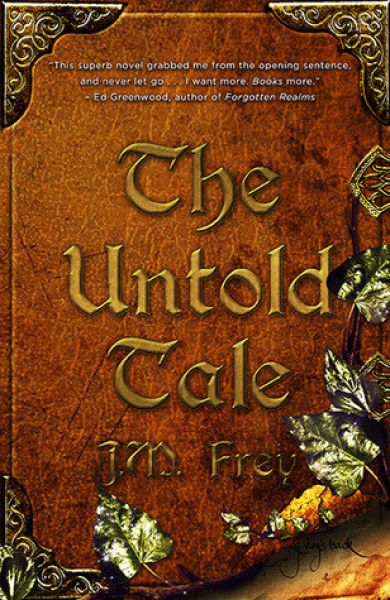Into the Magic Night
The Untold Tale (Accidental Turn, volume 1)
By J. M. Frey

20 Jan, 2017
A Year of Waterloo Region Speculative Fiction
0 comments
To quote the bio in her novel:
(J. M. Frey) is a voice actor, SF/F author, professionally trained music theatre performer, not-so-trained but nonetheless enthusiastic screenwriter and webseries-ist, and a fanthropologist and pop culture scholar. She’s appeared in podcasts, documentaries, radio programs, and on television to discuss all things geeky through the lens of academia.
Frey has been nominated for both the Aurora and the Lambda Awards.
2015’s The Untold Tale is the first volume in The Accidental Turn series.
Kintyre Turn is a bona fide hero, complete with the magic sword Foesmiter and his very own loyal sidekick, Sir Bevel. Most damsels in distress, at least the ones from Hain, would be relieved to get Kintyre’s help. Lucy “Pip” Piper isn’t from Hain and she’s not at all relieved to be rescued by Kintyre. That’s because she has to make do with Kintyre’s much less impressive stuttering brother Forsyth.
Forsyth didn’t actually save her in person. The Shadow Hand of Hain (spymaster extraordinaire) has Men for that sort of task. To make matters worse, while his Men did manage to retrieve Pip from the Big Bad, the Viceroy, it was only after Pip has suffered extensive torture. While this is a victory of sorts — she is the first of the Viceroy’s victims recovered alive — it is at best a mixed victory.
Forsyth does not think much of himself, but he is in fact a competent Shadow Hand. Pip is an anomaly. She’s clearly not a commoner but she also does not seem to fit into any of Hain’s social strata. She is also not obviously any of the varieties of foreigner familiar to Forsyth. Wherever she is from, it must be somewhere very distant indeed.
Somewhere meta-distant, in fact. Pip comes from a world in which Kintyre and Forsyth figure in novels — namely, The Tales of Kintyre Turn by Elgar Reed. Pip is not only one of the author’s more devoted fans; she’s an academic fan, who writes papers on the series:
“I did my thesis on the books. I know more about the world that Reed wrote than probably Reed, or his editor, or anyone else, because I analyzed all the stuff under the words.”
Now that Pip is trapped inside the novels, she could be a deadly weapon in the hands of the Viceroy. It is advisable not only to rescue her, but to return her to her own world. That requires a quest. As Kintyre is not available, that leaves only Pip and Forsyth to carry it out.
And Forsyth is not at all sure that he wants to return Pip. His Author, it seems, has a weakness for Love at First Sight.
~oOo~
There’s a From Elfland to Poughkeepsie moment early in the story, when Pip first starts talking and what comes out is contemporary vernacular. I am not a purist — I think it’s OK for The Lord of the Rings to have an English edition as well as the original Westron — but I prefer it if characters in secondary worlds don’t sound like they come from Toronto. Or worse, Brantford. As it turns out, Pip does come from our world; it makes perfect sense that she would talk the way that she does.
This foreshadows something else in the book, a something that Forsyth notes but does not take properly into account. The Author, Elgar Reed, puts a heavy hand on the plot when necessary, rendering his characters selectively blind to any pesky details that would derail the desired narrative. If Pip were reading the adventure rather than being in it, she probably would jot a snide comment in the margins. Alas! she is trapped in the story. Once there, she is just as clueless as any of the other characters.
Many people find it a comfort to believe they have an Author and to trust that the various injustices and infelicities of their world serve some greater end. The unfortunates in this story don’t have that assurance. While Reed isn’t a malevolent figure, a Drosselmeyer or even a Horace Hackett, he is, shall we say, selectively benevolent. He sends multitudes of spear carriers and redshirts to certain doom. They must suffer to give Kintyre a reason to wield Foesmiter in manly martial combat.
Pip, presumably as familiar with metafiction as she is Reed’s fiction and armed with knowledge of what happens to academics drawn into the work they study—a surprisingly common hazard in Canadian academia—might expect to fill the role of a Mary Sue, that perfect character everyone adores, without whose efforts the villain would succeed. What she gets is raped, tortured, and a bad case of PTSD. Moreover, far from being a welcome savior, she is by her very nature a significant threat to the natural order of things in Reed’s world. Not so Mary Sue.
This novel is chockfull of all sorts of secondary-world fantasy tropes. On first encounter with such a trope, I would start to feel mildly annoyed. Oh no, not that old thing again. Then things would swerve and I would find, to my delight, that Frey was using that trope for a purpose that I had not at all expected.
Hence I have no idea what to expect from the rest of this series. As I enjoy being pleasantly surprised, I will be following the series with keen interest.
The Untold Tale is available here.
